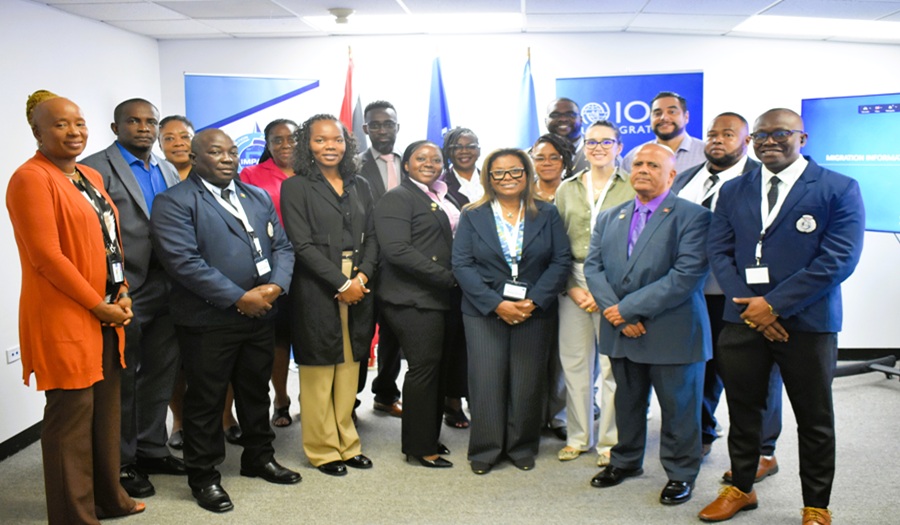Caribbean immigration, data experts trained in data collection, protection, and security
Fourteen government officials from across the Caribbean successfully completed a Regional Training of Trainers (ToT) on Data Collection, Protection, and Security, held from 21 to 25 July 2025 in Port of Spain, Trinidad and Tobago. With this training, a regional pool of trainers is now equipped to deliver high-quality national training sessions on data protection and ethical data use, which is a key step toward building resilient border governance systems, and enhancing cooperation among Caribbean countries to address migration and transnational crime.
The training was collaboratively conducted by the Caribbean Community (CARICOM) Implementing Agency for Crime and Security (IMPACS) and the International Organization for Migration (IOM), as part of broader efforts to enhance border and migration data governance in the Region. The training was held at CARICOM IMPACS’ headquarters.
Lt. Col. Michael Jones, Executive Director, CARICOM IMPACS, explained that this cadre of experts was now positioned to deliver enhanced, standardized training across CARICOM Member States to ensure uniform application of data protection and ethical use principles. “As we embrace the complete operationalization of Passenger Name Record (PNR) systems across the Caribbean by 2026, this training was critical to building the human infrastructure needed for intelligence-led border security, enhanced inter-agency co-operation and the protection of personal data in keeping with international standards”.
Participants represented immigration departments, law enforcement agencies, and ministries of national security and Information, Communication and Technology (ICT) from Antigua and Barbuda, The Bahamas, Barbados, Guyana, Saint Kitts and Nevis, Saint Lucia, and Trinidad and Tobago. These countries were selected due to their strategic geographic locations, as well as their identification of the need for specialised training in data protection and governance, and their readiness to serve as hubs to deliver this training to other CARICOM Member States, with the understanding that future trainings will seek to engage a broader set of Member States.
Dr. Mashma Sealy, Saint Lucia’s Assistant Commissioner of Police found the training enlightening. “During this course, I learned how effective data collection methods ensure accuracy, relevance and ethical compliance to make evidence-based policy decisions.” She added that the training helped her to learn best practices for data security, and the importance of data sharing to improve interagency cooperation while protecting privacy.
Ganyell Lewis-Francis, Immigration Officer in the Bahamas, also welcomed the opportunity to participate: “The IOM/IMPACS training was exceptionally informative and well-structured, providing both theoretical insights and practical tools. The facilitators demonstrated deep expertise and created an engaging learning environment that encouraged meaningful discussion. I now feel well-equipped not only to apply best practices in data protection and security but also to confidently share this knowledge and train others in my organization.”
The ToT combined technical sessions on data literacy and analysis, personal data protection, information sharing protocols, and intelligence-led border management, with practical exercises and facilitation techniques. Particular emphasis was placed on equipping participants to cascade the training in their national institutions. To this end, the agenda included applied micro-teaching, role-playing exercises, evaluation design, and the preparation of national training action plans.
“This training comes at a critical time, as Caribbean countries continue to build more integrated and secure systems to manage migration,” said Isadora Steffens, IOM´s Programme Support Officer for the Caribbean, adding that “ensuring the protection and responsible use of data is essential to safeguarding the rights of migrants and local communities and enhancing policy responses.”
This initiative is part of the Tripartite Collaborative Action Plan to Combat Migrant Smuggling in the Caribbean, developed by CARICOM IMPACS, IOM and the United Nations Office on Drugs and Crime (UNODC) in October 2024.




